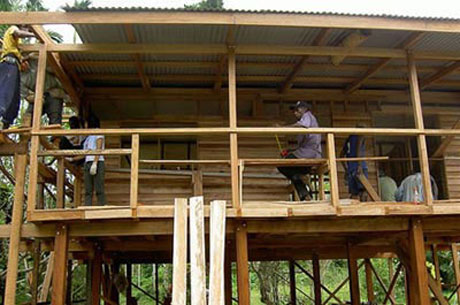
Habitat Routine
MB talks about the daily routine for Habitat for Humanity.
Matthew: So, MB, with Habitat For Humanity, can you kind of describe for us a normal day at one of the work-sites?
MB: Sure, so we usually get up very early in the morning, probably around 6:30 in the morning and when we were in Papua New Guinea we had to walk to the area where we were going to have breakfast so we had to walk through the village and say good morning to all the villagers and then we shared breakfast together with our team which the villagers prepared for us.
Matthew: What kind of food was that?
MB: In Papua New Guinea they eat a lot of potatoes and sweet potatoes and and some fish and some noodles but mostly their staple... and also bananas. They have a lot of plants or fruits that they grow on their property we ate a lot of that and then after breakfast we usually have a short orientation about what kind of jobs we're going to do that day and we're usually broken down into different teams and then we work for maybe two hours and then we have a short break and then we work again until lunch time. These jobs can be anything from planing wood or cutting wood or helping to lay the floor or putting up the walls or painting the walls or anything like that. And then we have lunch with the team and also with the villagers usually and after lunch we, in the past, we usually play with the children after lunch for a little while and then we go back to work for maybe about three or four hours in the afternoon. And night-time is cleaning up as well as having dinner again together with our team, or with the villagers. It really depends and then we usually have a meeting where all the team members get together and we have a reflection time about what happened that day or any problems, or we get a chance to talk to each other about the different jobs we were doing, so it's a very busy day, every day, but it's really satisfying and a lot of fun and we learn so many things, so many new things every day.
Matthew: That's great. You did mention that during the reflections, you talked about any problems that occurred. What kind of problems have occurred?
MB: Not so many, but in the past sometimes students get sick or they don't adjust to the heat of the country were in or they're not used to working physical, doing physical work every day or, so they're getting tired easily or something like that, or sometimes we just talk about problems in adjusting to the new culture. Sometimes it's very hard and very sad to see such poverty and to see people suffering but if we have a chance to share our feelings with each other it makes it easier to talk about and to think about.
orientation

We usually have a short orientation.
An 'orientation' is a meeting or a tour where people are introduced to a new job, place or activity. Notice the following:
- There's an orientation for new students at the university tomorrow.
- All new employees must attend the company orientation.
reflection time

We have a reflection time about what happened that day.
When we 'reflect,' we think carefully about an experience we have had. Notice the following:
- After the loss, the team had a reflection time.
- The long flight home was a time of reflection.
adjust to the heat

Sometimes students don't adjust to the heat of the country.
When we 'adjust to the heat,' that means after some time, hot weather is not a problem for us. Notice the following:
- Thailand was interesting, but it took days to adjust to the heat.
- I enjoyed South East Asia, but I just couldn't adjust to the heat.
physical work

They're not used to doing physical work every day.
'Physical work' is a job we do with our hands and muscles. Notice the following:
- Physical work is difficult for older people.
- Farming is difficult physical work.
adjusting to the new culture

Sometimes we talk about adjusting to the new culture.
When we adjust to a new culture, we become comfortable with what is different from our own culture. Notice the following:
- Being from Europe, adjusting to Asian culture was difficult for me.
- It takes time to adjust to a new culture.
Vocabulary Quiz
physical • new culture


















